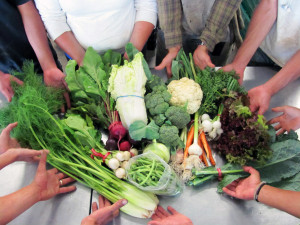Alternative Foodways can be described as a food system that is both geographically and economically accessible to the community, but is generally in opposition to the conventional food system. These alternatives seek to provide an increase in access, when considering the quality of food, by relocalizing both production and distribution of locally grown products. This is done by implementing foodways such as farmer’s markets, community supported agriculture, and community gardens. The ultimate goal for alternative food systems is to incorporate sustainability both environmentally and socioeconomically.
Alternative food ways have played a prominent role in combating food insecurity and provide a form of access that battles the conventional food system in many ways. Today producers and consumers seldom interact, let alone have a knowledge of how and where their food is being produced. Alternative Food ways changes that. The consumer now can regulate and collaborate with the farmer which empowers the consumer to have more control.
Creating a system that encompasses alternative food ways is just a step. Not a solution. Many communities still have very few reliable access points where local or organic produce can be found, and alternative options may be harder to implement. But with the proper promotion and expansion local communities can be better informed and equipped to achieving a thriving alternative food way.
